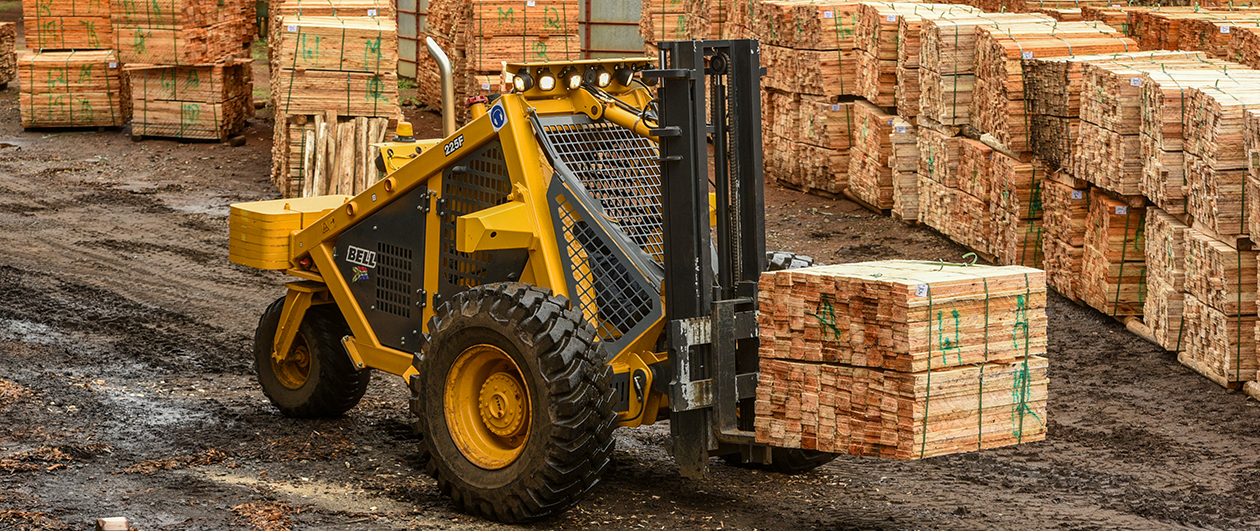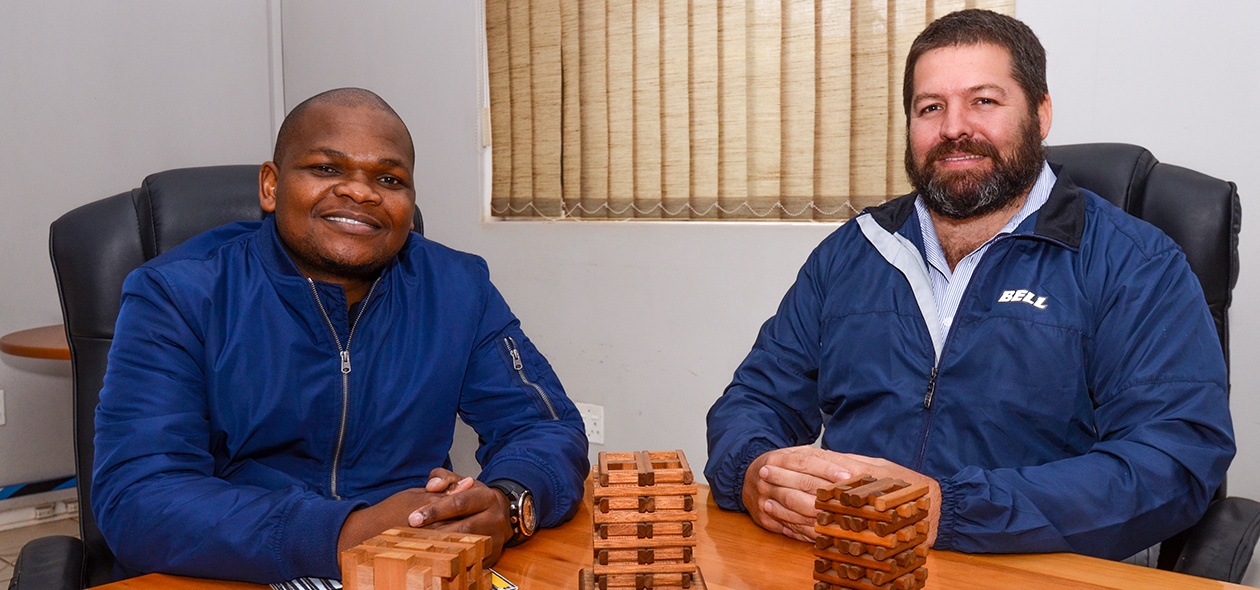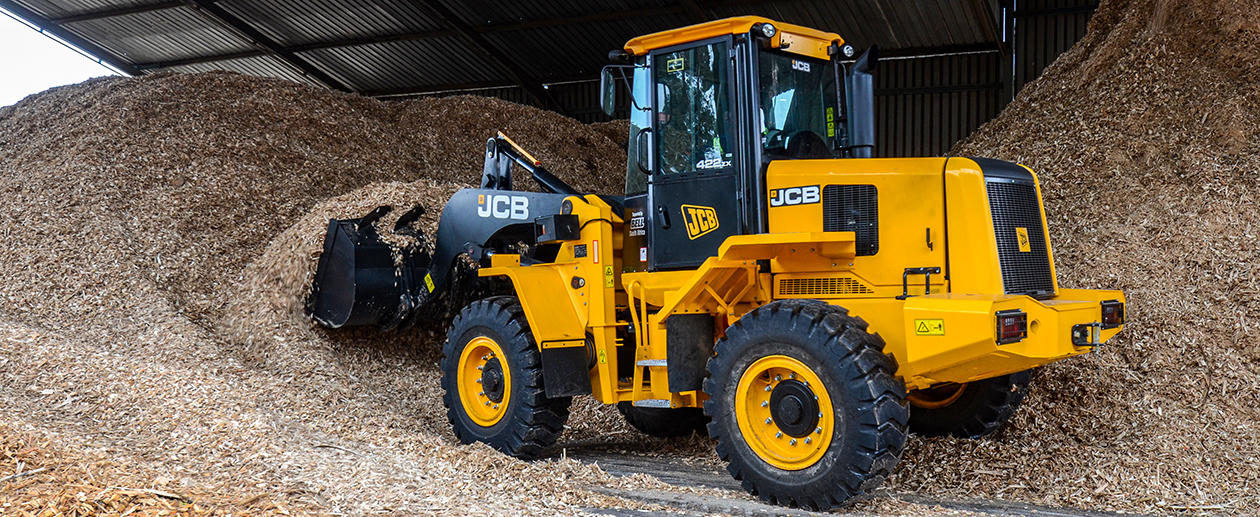Timrite grows its fleet with Bell Forklift and JCB Wheel Loader
Published: 08 September 2022

A marked saving in fuel consumption has justified the purchase of new and more efficient material handling equipment for a Mpumalanga-based manufacturer of timber products.
The Thebe Group of companies owns amongst many other entities, three sawmills that supply specialised timber products for use in mining support systems. The mills also produce structural timber and that used in furniture manufacture and are situated at Bushbuckridge, White River and at Kemp, just outside of Piet Retief. It was at the latter where we met with Emmanuel Sithole, Saw Mill Manager for that Timrite mill.
“We buy in timber from local and distant larger growers, some from neighbouring Eswatini, and work exclusively with Eucalyptus grandis and dunnii hardwoods,” Emmanuel explains. “At this mill, 80% of our production gets used for mining support timber and the rest as wet off-saw timber, meaning it’s not dried and is then used for the wooden pallet market.”
E.grandis and E.dunnii is sold in tons as opposed to softwoods like pine which is sold in cubic metres.
The Timrite mill specifies that its raw timber be cut to 2,4 metre lengths and the taper should not exceed 0,8cm per metre in length. This leads to uniformity in production, which the mill regards as an important quality aspect. A standout feature of the mill’s use of its precious resource is that no part of the log is wasted. “What we don’t use for either mining support timber or pallets, meaning chips and sawdust, is sold to a nearby particle board mill, which turns those smaller bits into chip board,” Emmanuel adds.
He goes on to explain that Timrite creates three different sets of mining support timber products at his facility, namely packs, trims and splits which all differ in lengths and thicknesses. These are then transferred (in component form) to another division of the company that creates the various formations of mine supports such as the Timrite Apollo Mat and Timrite Lexus Mat and sells these on to mining houses. These mine supports are used in especially deep gold mines in the Free State, North West Province and Gauteng.
“We form the backend of the supply chain while our sales department, which deals with the mining houses, is referred to as the frontend,” he says. “Our colleagues in the frontend also test the timber for strength and coat it in a fire-retardant solution.”
When raw timber arrives at the Timrite mill, it is unloaded from trucks using an overhead crane. All other handling of the 2,4m logs is done using two Bell 220A Loggers. “These two Bell 220A Loggers are at least 10 years old and have been well used in that time as we have a policy of getting the maximum out of our mechanical equipment, really sweating each machine,” Emmanuel says with a smile. “The longevity of these Bell Loggers is great testament to the machine’s proven quality in design and build as they simply keep soldiering on.”
Early in the second half of 2021, Timrite decided to replace two older machines, a rough terrain forklift and a wheel loader fitted with a quick-attach bucket and fork option. These had become uneconomical to operate further and were sold out of hand.
“The long-standing and solid relationship our company had forged with Bell Equipment stood us in good stead as we could confidently turn to Bell Equipment’s Sales Representative in Nelspruit, Daniel van Huyssteen, for advice on what the company could offer us,” Emmanuel says. “Daniel listened to what our needs were and suggested the Bell 225F three-wheeled Forklift and the JCB 422ZX Wheel Loader with their respective 3,5 ton and 6,6 ton lifting capabilities.”
The equipment was ordered in July 2021 and delivered two months later in September.
“We use the Bell 225F Forklift to move strapped packs of processed timber to the export yard where it is stacked and as the terrain is uneven and even muddy in the wet season. The traction those big front wheels on the Bell Forklift deliver, sees it trundling along effortlessly,” Emmanuel says.
Timrite currently use their new JCB 422ZX Wheel Loader to move and stockpile around 100 tons of woodchips every day. They have plans to convert the front frame to be able to swap between a bucket and a set of forks quickly as different needs arise.
“Having new equipment is great as one is assured of sustained uptime, but I feel it would be amiss not to mention things we noticed immediately such as the noise levels that are much less on especially the Bell 225F Forklift,” Emmanuel says. “That new Yanmar engine is really quiet and that is also why the very audible reverse siren is a great safety feature.”
Emmanuel is of the opinion that the extended service intervals, now at 500 hours, will provide for more productive time. Centralised grease points lower down on the machine are easily accessible and the Bell design engineers have reduced the vibration in the machine.
“You would appreciate that fuel consumption is a major overhead for us but we’ve been pleased to see that both the Bell 225F Forklift and the JCB 422ZX Wheel Loader each use at least one litre of diesel less per hour than their predecessors which, at current utilisations of 1 000 hours per year per machine, is a huge saving in diesel to us and will have a direct and positive impact on our operating costs.”
The Bell 225F Forklift has been returning fuel consumption figures of 3,5 to 4,5 litres per hour and the JCB 422ZX Wheel Loader, 6,5 to 7 litres.
“Our operators took to the new machines seamlessly and comment on how much smoother and responsive the controls are in both,” Emmanuel says. “Another big plus for us is the fact that Bell Equipment has a branch with mechanics and a good parts holding on our doorstep in Piet Retief, and our experience of the company’s service of late has been nothing short of phenomenal.”

Timrite Saw Mill Manager, Emmanuel Sithole (left), and Bell Equipment Sales Representative, Daniel van Huyssteen, with some miniature samples of the Timrite Apollo Mat and Lexus Mat support packs.

